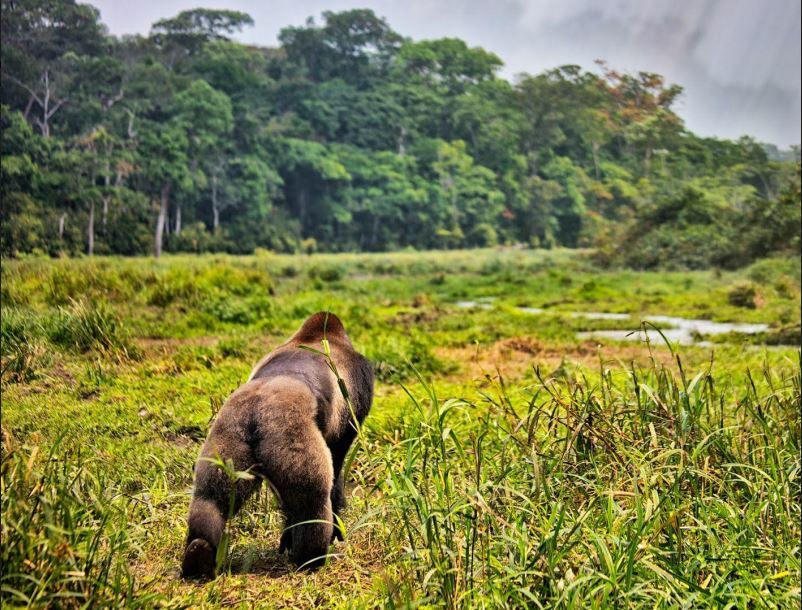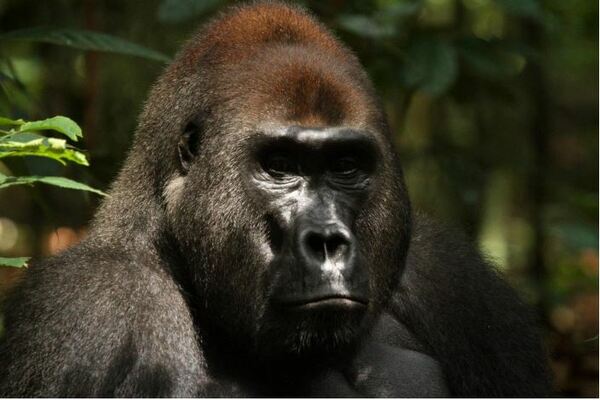
Makumba, a well-known habituated silverback gorilla in the Dzanga Sangha Protected Area of the Central African Republic, sadly passed away on May 15, 2024.
His death was a result of a fight with a solitary male gorilla, marking the end of his significant role in both tourism and conservation efforts in the region.
Silverback gorillas in the wild typically live for about 35 to 40 years, although they can sometimes live longer under optimal conditions. In captivity, where they are protected from predators and provided with consistent medical care and nutrition, they can live up to 50 years or more.
Makumba, estimated to have been born in around 1979, lived for approximately 45 years, which is a remarkable lifespan for a wild gorilla.
Since 2000 Makumba has been a central figure in the habituation programme, attracting over ten thousand visitors and contributing extensively to gorilla research and conservation awareness. Teams have tracked Makumba for 365 days of the year for over 24 years and so it is no surprise that his loss has been taken very hard.
The passing of Makumba along with the other key silverbacks leading the Mata and Mayele groups, has left Dzanga Sangha without any fully habituated gorilla groups for tourist tracking. This will significantly impact ecotourism. Being able to spend time in the forest with habituated gorilla families is a major draw for visitors to the region and raises significant funds annually.
The demise of Dzanga Sangha's three habituated western lowland gorilla silverbacks :
Mata - silverback Mata passed away August 2022 after falling from a tree - a favourite pastime. He was just 32. Habituation of his family group began in 2010 but due to the political crisis in CAR his group did not open for tourism officially until 2019. Mata was a hands-on silverback - he would protectively push infants away from visiting tourists, and when vets attended to a snared female in 2018, he picked up her 3 month old baby and cared for it while she was treated - unusual tender behaviour for a silverback.
Mayele - silverback Mayele passed away September 2022 following a fight with a solitary male - he was found with nasty wounds and although veterinary teams attended and treated him, he unfortunately could not be saved. Mayele was known as a gentle giant and was very relaxed, with his family enjoying a lot of freedom and roaming a large area of forest. Habituation began in 2005 and his family started receiving tourists in 2010. Mayele was around 40 when he died.
Makumba - silverback Makumba passed away May 2024 following a fight. Makumba was known to researchers and trackers to be very calm despite his great size and strength, and he often displayed gentleness, particularly towards the younger members of his group. His calmness facilitated close encounters. The habituation of the Makumba group began in 2000, with the first tourists visiting in 2004.
Understanding Habituation
Habituation is a process where wild animals gradually become accustomed to human presence, allowing close observation without disrupting their natural behaviors. In Dzanga-Sangha, three gorilla groups have undergone habituation for tourism and research purposes. This initiative aims to ensure the long-term viability of gorilla populations while providing substantial benefits to the local community. Revenue from gorilla tracking constitutes about 50% of Dzanga-Sangha’s tourism income, making the habituation programme a crucial economic driver. It employs over 60 local individuals, including more than 40 Indigenous Ba’Aka, thereby fostering community engagement and serving as a pivotal conservation tool.
The Mongambe habituation camp has been temporarily closed as a result of the most recent loss, with teams now concentrated at the Baï-Hokou habituation camp.
Efforts to habituate new gorilla groups will continue.
For the moment it is proving very challenging to keep up with Makumba's family - they have scattered into the forest since his death and the solitary male, possibly who fought Makumba, is hanging about the females.
There is another gorilla family, which specialist habituation teams have followed for about a year. The teams believe there are several habituated females from the Mata group living within it and these females do tolerate a few minutes of company before moving away which is an encouraging sign.
Habituation is a long process requiring considerable patience and understanding.
Image: Makumba 1979? – 2024 © David Santiago, DSPA
Image at top: portrait of Makumba, © Nuria Ortega, DSPA




